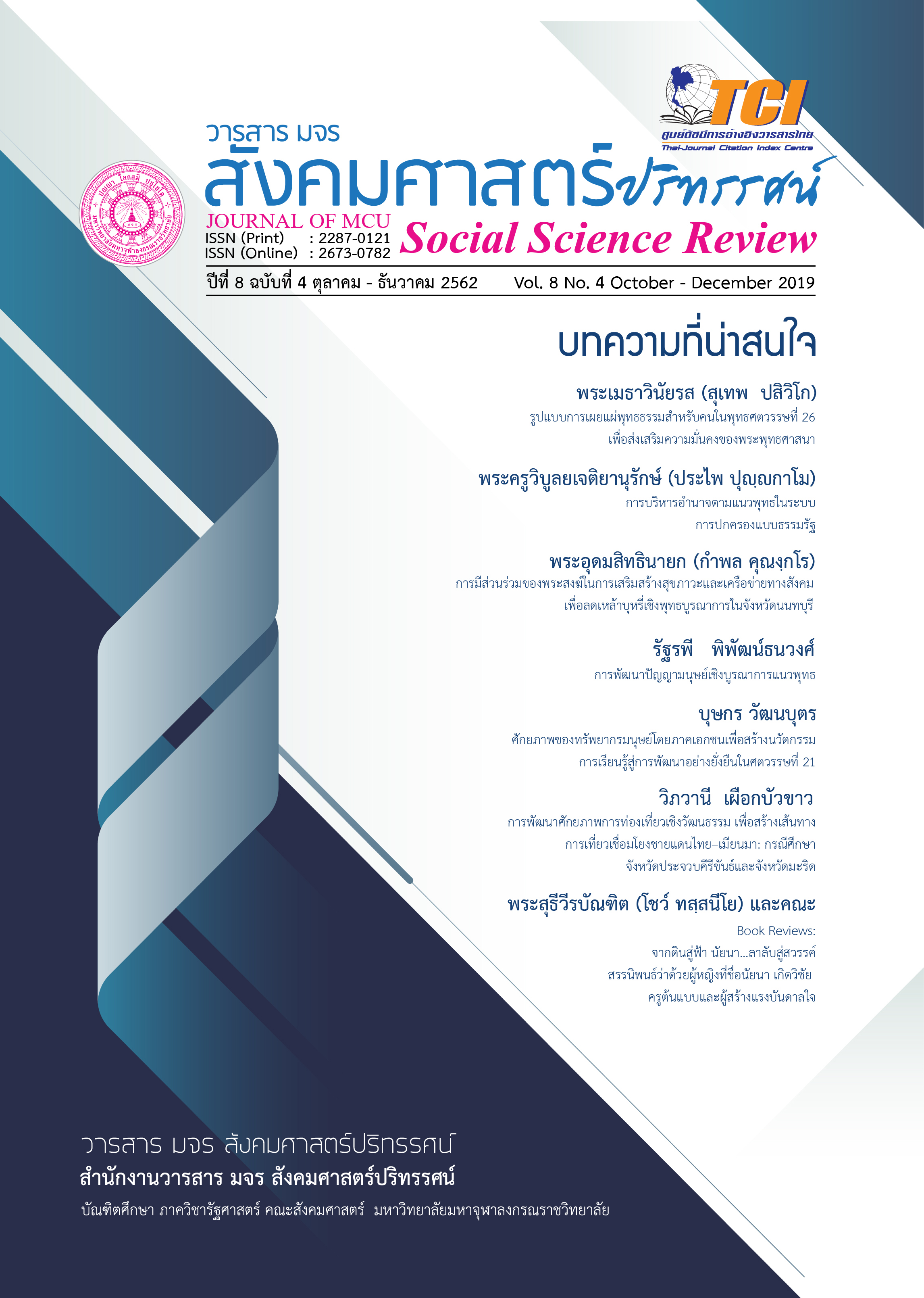การบริหารอำนาจตามแนวพุทธในระบบการปกครองแบบธรรมรัฐ
คำสำคัญ:
แนวพุทธ, การบริหารอำนาจ, การปกครองแบบธรรมรัฐบทคัดย่อ
การศึกษาการบริหารอำนาจตามแนวพุทธในระบบการปกครองแบบธรรมรัฐนี้ มีวัตถุประสงค์ ๔ ประการคือ ๑) เพื่อศึกษาการใช้อำนาจในการปกครองตามทฤษฎีทางรัฐศาสตร์ ๒) เพื่อศึกษาพุทธวิธีในการบริหาร ๓) เพื่อศึกษาพุทธผู้นำอำนาจการปกครองแบบธรรมรัฐ ๔) เพื่อเสนอทางเลือกในการจัดระบบการปกครองเพื่อความสันติสุขของพลเมือง ผลการวิจัยพบว่า การบริหารอำนาจการเมืองการปกครอง หมายถึง วิธีการดูแลบริหารรัฐในด้านต่างๆ ในทัศนะของนักวิชาการ หมายถึง การดูแลจัดการให้มนุษย์อยู่กันอย่างเป็นธรรมและเป็นระเบียบ ในทัศนะของนักวิชาการทางพระพุทธศาสนา หมายถึงการปกครองเพื่อการศึกษา เป็นการปกครองที่ทำให้เกิดความสงบเรียบร้อยจากการปกครองและความหมายโดยสรุปคือ การปกครองดูแลแผ่นดินที่เป็นอาณาเขตรัฐของตนรวมถึงการดูแลบำบัดทุกข์บำรุงสุขให้แก่ประชาราษฎร์ที่อาศัยอยู่ภายในแผ่นดิน ซึ่งมี ๓ บริบท คือ (๑) ทางการเมือง (๒) ทางสังคม และ (๓) ทางเศรษฐกิจทำให้ทราบว่า “ธรรมรัฐ” เป็นการปกครองโดยหลักธรรมที่พระราชาและผู้นำการปกครองจะต้องยึดถือเป็นข้อปฏิบัติให้เหมาะสมกับการเป็นอยู่ในสมัยนั้น ได้แก่ หลักทศพิธราชธรรม ๑๐ จักรวรรดิวัตร ๑๒ ราชสังคหวัตถุ ๔ อคติ ๔ ประการ ใช้สำหรับชนชั้นผู้นำและหลักธรรมที่ประพฤติร่วมกันทั้งชนชั้นผู้ปกครอง รูปแบบการบริหารการปกครองในคัมภีร์พระพุทธศาสนานั้นแบ่งเป็น ๒ รูปแบบ คือ ๑) การบริหารรัฐกิจแบบราชาธิปไตย คำว่า“ราชาธิปไตย” หมายถึง การปกครองโดยมีพระราชาเป็นใหญ่ เป็นการปกครองโดยบุคคลคนเดียว จัดเป็นรูปแบบการปกครองที่มีประสิทธิภาพมากที่สุด ๒) การบริหารการปกครองแบบสามัคคีธรรม คำว่า “สามัคคีธรรม” แปลว่า หลักการปกครองที่ชอบธรรม หมายถึง การปกครองที่พร้อมเพรียงอย่างชอบธรรม เป็นการปกครองโดยการรวมหลายรัฐแล้วเลือกผู้นำขึ้นมาคณะหนึ่งเพื่อทำหน้าที่บริหารประเทศ ส่วนหลักธรรมรัฐในฐานะเป็นเครื่องมือพัฒนาประชาธิปไตยในสังคมไทย เราจะเห็นได้ว่าในสังคมไทยมีปัญหาหลักๆ อยู่ ๓ ด้านด้วยกันคือ ด้านพลเมือง ด้านการเมือง และด้านระบบราชการ การประยุกต์ใช้เป็นเครื่องมือพัฒนาประชาธิปไตยในสังคมไทยสามารถประยุกต์ใช้ได้ ๔ แนวทาง ได้แก่
๑) หลักการของธรรมรัฐ เป็นเครื่องมือในการควบคุมตนเอง คือการควบคุมกาย วาจาและใจของตนเองให้เป็นไปในทางที่ถูกต้องและพึงประสงค์ของสังคม
๒) หลักการของธรรมรัฐ เป็นเครื่องมือในการพัฒนาตนเอง คือการเปลี่ยนแปลงหรือยกระดับตนเองทั้งด้านจิตใจและพฤติกรรม ให้มีความเหมาะสมและให้สอดคล้องกับสิ่งที่สังคมประชาธิปไตยคาดหวัง
๓) หลักการของธรรมรัฐ เป็นเครื่องมือในการตรวจสอบภายใน คือวิธีการให้คนเราคิดพิจารณาทบทวนและไตร่ตรองตรวจสอบพฤติกรรมต่างๆ ของตนเองทั้งในอดีตและปัจจุบันตามกรอบของหลักธรรมรัฐ เพื่อให้ความถูกต้องความดีงามเกิดกับชีวิตของตนเองและมีความผิดพลาดน้อยลง
๔) หลักการของธรรมรัฐ เป็นเครื่องมือในการตรวจสอบภายนอก คือวิธีการพิจารณาตรวจสอบโดยผู้ตรวจสอบจากภายนอกอาจจะเป็นบุคคลหรือหน่วยงานอื่นตามกรอบหรือตามมาตรฐานของธรรมรัฐ เพื่อให้ผู้ปกครองและผู้ที่ถูกปกครองในระบอบประชาธิปไตยได้แสดงความรับผิดชอบต่อสิ่งที่ตนเองทำ
เอกสารอ้างอิง
Phra Dhammapidok (Por Payutto). (2000). Learning Process for Developing People Towards Democracy. Bangkok:Mahachulalongkornrajavidyalaya University
_________. (1998). Thammanoon Chivasit. Bangkok: Sahamatham Publishing Company Limited.
Chamnong Thongprasert. (2002). Thai language conversation. Dharma language. ้http://www.tpschammong.iirt.net.
Kittisak WimonSantisangsi. (2001). Expectations of Bangkok Bank Public Company Limited Personnel on the Role of Trade Unions. Chiang Mai University.
Denhardt.(2003). Janet V. and Robert B. Denhardt. The New Public Service: Serving, not Steer. New York: M.E. Sharpe, Inc.
Boonmi, Thirayuth.(2002). Good Governance: A Strategy to Restore Thailand. In Duncan McCargo. (ed.) Reforming Thai Politics.
ดาวน์โหลด
เผยแพร่แล้ว
รูปแบบการอ้างอิง
ฉบับ
ประเภทบทความ
สัญญาอนุญาต
ลิขสิทธิ์ (c) 2019 วารสาร มจร สังคมศาสตร์ปริทรรศน์

อนุญาตภายใต้เงื่อนไข Creative Commons Attribution-NonCommercial-NoDerivatives 4.0 International License.
เพื่อให้เป็นไปตามกฎหมายลิขสิทธิ์ ผู้นิพนธ์ทุกท่านต้องลงลายมือชื่อในแบบฟอร์มใบมอบลิขสิทธิ์บทความให้แก่วารสารฯ พร้อมกับบทความต้นฉบับที่ได้แก้ไขครั้งสุดท้าย นอกจากนี้ ผู้นิพนธ์ทุกท่านต้องยืนยันว่าบทความต้นฉบับที่ส่งมาตีพิมพ์นั้น ได้ส่งมาตีพิมพ์เฉพาะในวารสาร มจร สังคมศาสตร์ปริทรรศน์ เพียงแห่งเดียวเท่านั้น หากมีการใช้ภาพหรือตารางหรือเนื้อหาอื่นๆ ของผู้นิพนธ์อื่นที่ปรากฏในสิ่งตีพิมพ์อื่นมาแล้ว ผู้นิพนธ์ต้องขออนุญาตเจ้าของลิขสิทธิ์ก่อน พร้อมทั้งแสดงหนังสือที่ได้รับการยินยอมต่อบรรณาธิการ ก่อนที่บทความจะได้รับการตีพิมพ์ หากไม่เป็นไปตามข้อกำหนดเบื้องต้น ทางวารสารจะถอดบทความของท่านออกโดยไม่มีข้อยกเว้นใดๆ ทั้งสิ้น





